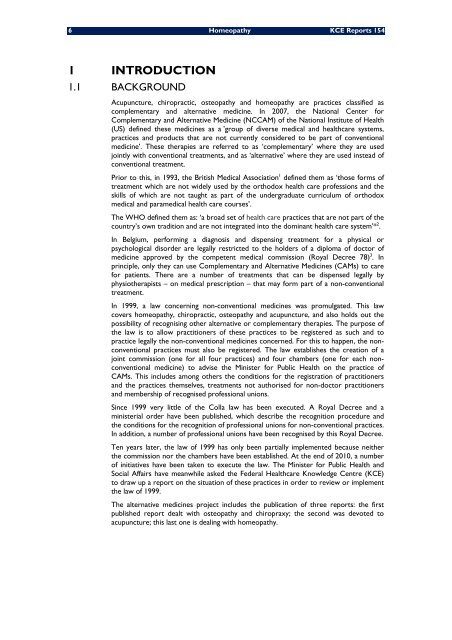Etat des lieux de l'homéopathie en Belgique - KCE
Etat des lieux de l'homéopathie en Belgique - KCE
Etat des lieux de l'homéopathie en Belgique - KCE
You also want an ePaper? Increase the reach of your titles
YUMPU automatically turns print PDFs into web optimized ePapers that Google loves.
6 Homeopathy <strong>KCE</strong> Reports 154<br />
1 INTRODUCTION<br />
1.1 BACKGROUND<br />
Acupuncture, chiropractic, osteopathy and homeopathy are practices classified as<br />
complem<strong>en</strong>tary and alternative medicine. In 2007, the National C<strong>en</strong>ter for<br />
Complem<strong>en</strong>tary and Alternative Medicine (NCCAM) of the National Institute of Health<br />
(US) <strong>de</strong>fined these medicines as a ’group of diverse medical and healthcare systems,<br />
practices and products that are not curr<strong>en</strong>tly consi<strong>de</strong>red to be part of conv<strong>en</strong>tional<br />
medicine’. These therapies are referred to as ‘complem<strong>en</strong>tary’ where they are used<br />
jointly with conv<strong>en</strong>tional treatm<strong>en</strong>ts, and as ‘alternative’ where they are used instead of<br />
conv<strong>en</strong>tional treatm<strong>en</strong>t.<br />
Prior to this, in 1993, the British Medical Association 1 <strong>de</strong>fined them as ‘those forms of<br />
treatm<strong>en</strong>t which are not wi<strong>de</strong>ly used by the orthodox health care professions and the<br />
skills of which are not taught as part of the un<strong>de</strong>rgraduate curriculum of orthodox<br />
medical and paramedical health care courses’.<br />
The WHO <strong>de</strong>fined them as: ‘a broad set of health care practices that are not part of the<br />
country’s own tradition and are not integrated into the dominant health care system’* 2 .<br />
In Belgium, performing a diagnosis and disp<strong>en</strong>sing treatm<strong>en</strong>t for a physical or<br />
psychological disor<strong>de</strong>r are legally restricted to the hol<strong>de</strong>rs of a diploma of doctor of<br />
medicine approved by the compet<strong>en</strong>t medical commission (Royal Decree 78) 3 . In<br />
principle, only they can use Complem<strong>en</strong>tary and Alternative Medicines (CAMs) to care<br />
for pati<strong>en</strong>ts. There are a number of treatm<strong>en</strong>ts that can be disp<strong>en</strong>sed legally by<br />
physiotherapists – on medical prescription – that may form part of a non-conv<strong>en</strong>tional<br />
treatm<strong>en</strong>t.<br />
In 1999, a law concerning non-conv<strong>en</strong>tional medicines was promulgated. This law<br />
covers homeopathy, chiropractic, osteopathy and acupuncture, and also holds out the<br />
possibility of recognising other alternative or complem<strong>en</strong>tary therapies. The purpose of<br />
the law is to allow practitioners of these practices to be registered as such and to<br />
practice legally the non-conv<strong>en</strong>tional medicines concerned. For this to happ<strong>en</strong>, the nonconv<strong>en</strong>tional<br />
practices must also be registered. The law establishes the creation of a<br />
joint commission (one for all four practices) and four chambers (one for each nonconv<strong>en</strong>tional<br />
medicine) to advise the Minister for Public Health on the practice of<br />
CAMs. This inclu<strong><strong>de</strong>s</strong> among others the conditions for the registration of practitioners<br />
and the practices themselves, treatm<strong>en</strong>ts not authorised for non-doctor practitioners<br />
and membership of recognised professional unions.<br />
Since 1999 very little of the Colla law has be<strong>en</strong> executed. A Royal Decree and a<br />
ministerial or<strong>de</strong>r have be<strong>en</strong> published, which <strong><strong>de</strong>s</strong>cribe the recognition procedure and<br />
the conditions for the recognition of professional unions for non-conv<strong>en</strong>tional practices.<br />
In addition, a number of professional unions have be<strong>en</strong> recognised by this Royal Decree.<br />
T<strong>en</strong> years later, the law of 1999 has only be<strong>en</strong> partially implem<strong>en</strong>ted because neither<br />
the commission nor the chambers have be<strong>en</strong> established. At the <strong>en</strong>d of 2010, a number<br />
of initiatives have be<strong>en</strong> tak<strong>en</strong> to execute the law. The Minister for Public Health and<br />
Social Affairs have meanwhile asked the Fe<strong>de</strong>ral Healthcare Knowledge C<strong>en</strong>tre (<strong>KCE</strong>)<br />
to draw up a report on the situation of these practices in or<strong>de</strong>r to review or implem<strong>en</strong>t<br />
the law of 1999.<br />
The alternative medicines project inclu<strong><strong>de</strong>s</strong> the publication of three reports: the first<br />
published report <strong>de</strong>alt with osteopathy and chiropraxy; the second was <strong>de</strong>voted to<br />
acupuncture; this last one is <strong>de</strong>aling with homeopathy.

















